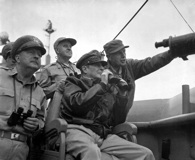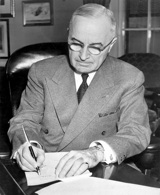Truman & MacArthur – Book Review
Personalities
 The Douglas MacArthur that emerges from the pages of Pearlman’s book is perhaps best summed up in this passage: “All human beings are complex and inconsistent: part admirable, party petty. However, whereas most people are moderately good or relatively bad, MacArthur played at the edges. ‘The best and the worst things you hear about him,’ said one allied general, ‘are both true.’” Pearlman refers to this as MacArthur’s “Dr. Jekyll-Mr. Hyde syndrome” and claims it was the “one striking factor in MacArthur’s make up,” evidenced by “rapid mood swings between excessive optimism and equal pessimism.” He could be overwhelmingly charming, gracious and incredibly persuasive; yet after a half century of distinguished service – he had been at the very top of his profession for two decades before Korea broke out – MacArthur could appear overbearing, imperious and condescending to lesser lights whom he perceived as challenging his judgment or who had the temerity to question the self assured rightness of his position on any subject. His putative military superiors in Washington, D. C. gave orders to other senior commanders; they negotiated with MacArthur.
The Douglas MacArthur that emerges from the pages of Pearlman’s book is perhaps best summed up in this passage: “All human beings are complex and inconsistent: part admirable, party petty. However, whereas most people are moderately good or relatively bad, MacArthur played at the edges. ‘The best and the worst things you hear about him,’ said one allied general, ‘are both true.’” Pearlman refers to this as MacArthur’s “Dr. Jekyll-Mr. Hyde syndrome” and claims it was the “one striking factor in MacArthur’s make up,” evidenced by “rapid mood swings between excessive optimism and equal pessimism.” He could be overwhelmingly charming, gracious and incredibly persuasive; yet after a half century of distinguished service – he had been at the very top of his profession for two decades before Korea broke out – MacArthur could appear overbearing, imperious and condescending to lesser lights whom he perceived as challenging his judgment or who had the temerity to question the self assured rightness of his position on any subject. His putative military superiors in Washington, D. C. gave orders to other senior commanders; they negotiated with MacArthur.
Raised by parents who were “striking figures with enormous drive and ambition,” MacArthur was imbued from birth with a sense of his own special destiny and a concept of personal honor that made him highly sensitive to any slight to it, real or imagined. When he assumed command of the U. S.-led United Nations effort to turn back communist aggression by Kim Il-Sung’s North Korea in 1950, MacArthur was 70 years old (a general officer since World War I), America’s most distinguished soldier of the 20th century, and the nation’s most popular World War II hero. Truman, of course, was none of those things, leading to the general consensus of American public opinion in the wake of the April 11, 1951 firing that “a brilliant general [was fired] by a less than brilliant President.”
{default} Harry Truman, according to Pearlman, was also “like most other people … subject to conflicting impulses,” and was seldom the tough, no-nonsense leader he preferred to imagine himself to be – despite the gutsy folk hero image Truman was anointed with decades after he left the presidency. Truman “was too nice a man to be the man he dreamed of being, except in rare moments when his temper took complete control.” An ‘accidental president’ who gained the White House when Franklin D. Roosevelt died in April 1945 (although he won it in his own right in the ‘photo finish’ 1948 election), Truman grew up idolizing historical military leaders, like Hannibal, Andrew Jackson, and Robert E. Lee. The young Truman even tried to attend West Point, but was turned down due to poor eyesight. Pearlman notes this as an important character-forming milestone, writing “the rejected applicant subsequently harbored mixed feelings of anger, envy, and inferiority toward [West Point] graduates.” Truman once lashed out that West Pointers were “trained to think they are gods in uniform,” damning the “class distinctions and cliques which now exist through the snobbery created by the academies.” He was extremely proud of his World War I service as an artillery battery commander, but resented what he felt was the condescension with which reserve officers, like himself, were treated by regulars. In fact, as president, Truman chose his old Missouri National Guard “courthouse cronies” as his personal military aides, rather than using regular officers in those positions, as most presidents typically do (he persisted in such cronyism even when charges of influence peddling by his National Guard clique tarnished his administration – a “loyalty” issue for Truman, an important virtue that would loom large in his later decision to fire MacArthur). Perhaps tellingly, long before the April 1951 confrontation, according to Pearlman, “MacArthur could be a lightning rod for [Truman’s] resentment” of professional soldiers. It is no surprise, therefore, that Truman often referred to MacArthur sarcastically as “God’s right hand man; Mr. Prima Donna, Brass Hat Five Star,” occasionally adding “S.O.B.” to the description.
Harry Truman, according to Pearlman, was also “like most other people … subject to conflicting impulses,” and was seldom the tough, no-nonsense leader he preferred to imagine himself to be – despite the gutsy folk hero image Truman was anointed with decades after he left the presidency. Truman “was too nice a man to be the man he dreamed of being, except in rare moments when his temper took complete control.” An ‘accidental president’ who gained the White House when Franklin D. Roosevelt died in April 1945 (although he won it in his own right in the ‘photo finish’ 1948 election), Truman grew up idolizing historical military leaders, like Hannibal, Andrew Jackson, and Robert E. Lee. The young Truman even tried to attend West Point, but was turned down due to poor eyesight. Pearlman notes this as an important character-forming milestone, writing “the rejected applicant subsequently harbored mixed feelings of anger, envy, and inferiority toward [West Point] graduates.” Truman once lashed out that West Pointers were “trained to think they are gods in uniform,” damning the “class distinctions and cliques which now exist through the snobbery created by the academies.” He was extremely proud of his World War I service as an artillery battery commander, but resented what he felt was the condescension with which reserve officers, like himself, were treated by regulars. In fact, as president, Truman chose his old Missouri National Guard “courthouse cronies” as his personal military aides, rather than using regular officers in those positions, as most presidents typically do (he persisted in such cronyism even when charges of influence peddling by his National Guard clique tarnished his administration – a “loyalty” issue for Truman, an important virtue that would loom large in his later decision to fire MacArthur). Perhaps tellingly, long before the April 1951 confrontation, according to Pearlman, “MacArthur could be a lightning rod for [Truman’s] resentment” of professional soldiers. It is no surprise, therefore, that Truman often referred to MacArthur sarcastically as “God’s right hand man; Mr. Prima Donna, Brass Hat Five Star,” occasionally adding “S.O.B.” to the description.
With political roots in the corrupt Boss Pendergast machine that ran Kansas City, Truman perceived politicians as “mixtures of good and bad,” accepting their flaws along with their admirable qualities – he could work amicably and productively with the best and the worst of them (he even “thought well of Joe Stalin at their first meeting,” the 1945 Potsdam conference). Yet, growing up idolizing military heroes, Truman held them to a higher standard of virtue and perfection. He had no use for military leaders whom he perceived as failing to live up to those standards, and “wondered how the U. S. Army could ‘produce such men as Robert E. Lee, John J. Pershing, Eisenhower, and Bradley and at the same time produce Custers, Pattons, and MacArthur.’” In spite of despising MacArthur, however, Truman remained politically astute enough to bask in the reflected glow of the general’s popularity – when MacArthur was successful on the battlefield — such as he did at the Wake Island meeting in October 1950, a blatant “photo op” on the heels of MacArthur’s Inchon triumph that was intended to garner Democratic votes in the November congressional elections. When China’s intervention into the Korean War turned triumph into disaster, however, there were no more photo ops, and MacArthur’s annoying public pronouncements that put the general at odds with administration policy became especially galling and increasingly exasperating.
[continued on next page]


This writer is of the opinion that Mac Arthur knew full well what he was doing in his letter to Joe Martin.
I knew General Mac Arthur.
All he had to do was write a side bar note stating “personal and confidential”
or ” for your eyes only-not for publication”–as he did often.
n this case he did not.
He knew Joe Martin.
He knew Joe Martin would get up on the floor of congress and read it t loud and clear for all the world to hear.
Mac Arthur knew what would happen next.
He knew.
He fell on his sword.
With every good wish.
God bless.
JOHN W. BUGLER
BUGLER.ORG
I heard some very interesting information about a variety of historical events from a WWII/Korean veteran who was personally present and involved in them.My limited research and inquires have not served to disprove the truth of the somewhat detailed information related to me.I hope you can help me determine if what I was told could be true based upon facts you are aware of relating to the following brief statements.Included are:1)that the stand-by third atomic bomb for Japan would not work and was sent to Iwo Jima for trouble shooting.The problem was that a wire had not been hooked up;2)that when Truman had MacArthur relieved of command,he was arrested just after passing through some gate.(Through some communication device Truman heard what was taking place.One of the guards said,He is going for his gun.” Immediately Truman said,”If he does shoot him in the head.Don’t bring him in alive!” MacArthur was then placed under house arrest with guards being around the house; 3)that Truman took refuge at Camp David for about three weeks when MacArthur arrived in the U.S because of a fear that he might try to overthrow the government;and 4)that MacArthur was restricted to a 100 mile radius of his home and he would face charges by Truman if he violated this.>KENNETH PHILLIPS
I attended General Mc Arthur’s last birthday party which was
held at the Waldorf Towers in January of 1963. I had a brief
moment with him afterwards and asked for his assesment of
Harry Truman. With a wry smile and a wink at his friend Larry
Bunker he expressed these words to me. ” THE ONLY THING
NEGATIVE I WILL EVER SAY CONCERNING PRESIDENT
TRUMAN IS THAT HE WAS POORLY ADVISED.”